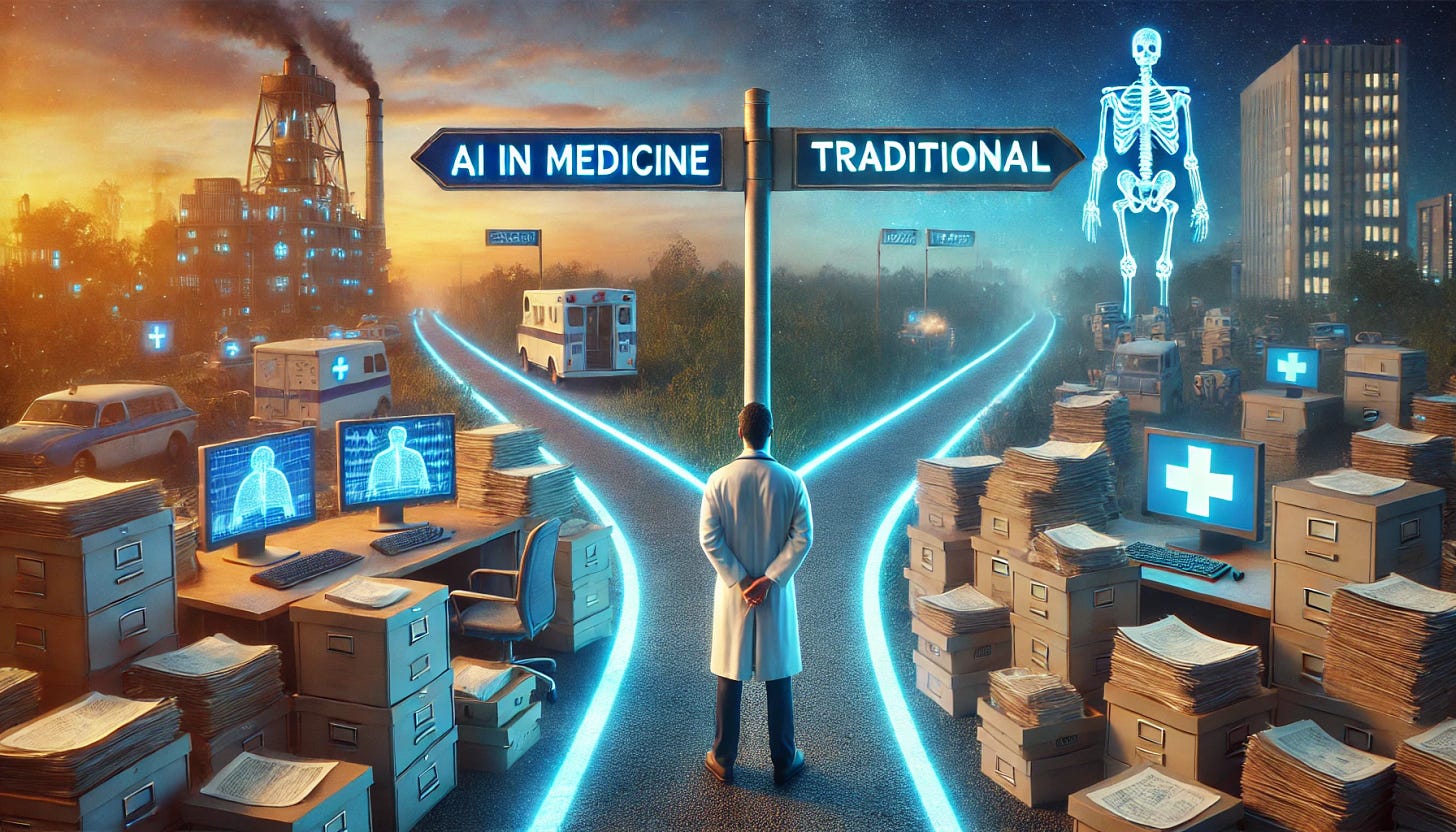Upgrade Your Health: How to Use AI to Transform Your Medical Journey
Smart Prompts to Cut Through Medical Confusion
Upgrade Your Health: How to Use AI to Transform Your Medical Journey
Smart Prompts to Cut Through Medical Confusion
AI isn’t a doctor, but it can be one of the most useful tools in your healthcare toolbox—helping you track symptoms, translate medical jargon, and communicate more effectively with your providers. If you’ve ever left a doctor’s office feeling like you forgot to mention something important—or walked away with a diagnosis that made no sense—AI can help bridge those gaps.
Used wisely, AI can make healthcare more accessible, organized, and patient-friendly. It won’t replace human expertise, but it can help you prepare for appointments, ask better questions, and make sense of your health journey with more confidence.
This guide breaks down exactly how to use AI for your health—along with the smartest prompts to ensure you’re getting useful, well-rounded answers.
1. Tracking Symptoms Without the Guesswork
Ever tried to explain a symptom to your doctor, only to realize you don’t quite remember when it started or how often it happens? AI can help you keep a clear, structured symptom log, making your medical visits more productive.
🔹 Try this prompt:
"Help me create a symptom journal for my recurring headaches, tracking when they happen, their severity, possible triggers, and any relief measures I’ve tried."
🔹 Or try this instead:
"Can you give me a structured format for tracking symptoms over time so I have a clear record to share with my doctor?"
🔹 Make sure AI gets it right:
"Does this log capture everything a doctor would need to know? What details might I be missing?"
2. Organizing Your Medical History Like a Pro
Doctors rely on structured health histories to diagnose and treat conditions effectively. AI can help format your symptoms and past medical events into a clear, organized record.
🔹 Try this prompt:
"I’ve had digestive issues for six months. Can you help me structure my medical history, including onset, duration, severity, associated symptoms, and potential triggers?"
🔹 Or how about this one?
"Summarize my past diagnoses, treatments, and any ongoing symptoms in an organized way."
🔹 Check AI’s work:
"Does this summary include all relevant details? Is there anything I should clarify before showing it to my doctor?"
3. Preparing for Your Doctor's Visit with the Right Questions
Doctor visits are short, and forgetting to ask something important is frustrating. AI can help you generate smart, focused questions so you make the most of your time.
🔹 Try this prompt:
"I was just diagnosed with high blood pressure. What questions should I ask my doctor about treatment options, lifestyle changes, and medication side effects?"
🔹 Or maybe this instead:
"Help me prepare a list of critical questions for my upcoming appointment about chronic fatigue."
🔹 Make sure AI is on track:
"Are there any additional or alternative questions that might be useful for my condition?"
4. Deciphering Diagnoses & Treatment Plans
Medical terms can sound overwhelming. AI can help break down diagnoses into understandable language or provide a deeper dive for those who want more details.
🔹 Try this prompt:
"I was diagnosed with hypothyroidism. Can you explain what this means, what symptoms to expect, and what treatment options exist?"
🔹 Or you could ask this:
"Give me both a simple and a detailed explanation of my condition so I can understand it better."
🔹 Verify AI’s response:
"Is this information aligned with reputable medical sources? Are there any areas where research is still evolving?"
5. Staying on Top of Medications
Managing multiple prescriptions is tricky. AI can create medication schedules, track side effects, and flag potential interactions to help you stay on top of your health.
🔹 Try this prompt:
"I take three different medications at different times of the day. Can you help me set up a medication schedule with reminders?"
🔹 Or better yet:
"Summarize common drug interactions between my prescriptions and any safety precautions I should know."
🔹 Double-check this with AI:
"Are there any potential drug interactions I should verify with my pharmacist?"
6. Mental Health Support and Coping Strategies
AI can assist with stress management by providing breathing exercises, cognitive behavioral therapy (CBT)-based thought reframing, and mindfulness techniques.
🔹 Try this prompt:
"I’ve been feeling anxious and overwhelmed. Can you guide me through a short mindfulness exercise or suggest some stress-relief techniques?"
🔹 Or this one instead:
"Give me a few evidence-based mental health strategies to help me manage stress better."
🔹 Make sure AI is offering solid advice:
"Are these techniques backed by reputable mental health practices?"
7. AI for Care Coordination Between Multiple Specialists
Patients with complex health conditions often see multiple doctors. AI can help them keep track of medical advice, medications, and conflicting recommendations.
🔹 Try this prompt:
"I see a cardiologist and an endocrinologist for separate conditions. Can you help me create a summary of my treatment plans to make sure they don’t conflict?"
🔹 Or consider this one:
"Summarize all my current medications and check if any of my specialists’ recommendations overlap or contradict."
🔹 Make sure AI isn’t missing anything:
"What should I double-check with my doctors before assuming this care plan is fully aligned?"
8. AI for Understanding Lab and Genetic Testing Results
Genetic testing and advanced lab work can be complex. AI can help break down results and explain what they mean in a patient-friendly way.
🔹 Try this prompt:
"I got a genetic test result showing I have an increased risk for breast cancer. Can you explain what this means and what I should ask my doctor?"
🔹 Or this one instead:
"Summarize my recent blood test results and highlight any values that might be concerning."
🔹 Check AI’s work:
"Are there factors that might influence the accuracy or relevance of this result?"
9. Navigating Insurance & Medical Bills
🔹 Try this prompt:
"I received a medical bill that seems higher than expected. Can you help me draft a letter to my insurance company to dispute the charges?"
🔹 Or maybe this instead:
"Can you break down this medical bill and help me identify potential errors or overcharges?"
🔹 Make sure AI is actually helpful:
"Are there any other ways I could save money or negotiate these medical expenses?"
10. AI for Long-Term Health Planning
🔹 Try this prompt:
"Can you help me create a long-term health strategy based on my current conditions and risk factors?"
🔹 Or go with this one:
"What preventative measures should I be focusing on to stay as healthy as possible in the long run?"
🔹 Check AI’s recommendations:
"Are these strategies backed by medical research, or should I verify with my doctor?"
11. AI for Understanding Lab and Genetic Testing Results
Genetic testing and advanced lab work can be complex. AI can help break down results and explain what they mean in a patient-friendly way.
Try This Prompt:
“I got a genetic test result showing I have an increased risk for breast cancer. Can you explain what this means and what I should ask my doctor?”
Keep AI in Check:
“Are there factors that might influence the accuracy or relevance of this result?”
12. AI for Managing Chronic Conditions
🔹 Try this prompt:
"I have diabetes. Can you suggest ways to better track my blood sugar and manage my condition?"
🔹 Or consider this one:
"What are the latest research-backed approaches to managing my chronic illness?"
🔹 Double-check AI’s advice:
"Are these recommendations evidence-based and aligned with clinical best practices?"
13. AI Can Help You Analyze Your Medical Records
Many AI tools can process uploaded medical documents, including lab reports, imaging summaries, and even doctor’s notes, helping patients better understand their health data.
🔹 Try this prompt:
"I uploaded a summary of my recent MRI scan. Can you explain the findings and tell me what I should ask my doctor?"
🔹 Or check this out:
"Can you help me summarize my last few doctor visits so I can track my health trends?"
🔹 Make sure AI isn’t misinterpreting anything:
"Are there any potential pitfalls in using AI for analyzing medical records? What should I confirm with my doctor?"
14. AI for Personalized Preventative Health Strategies
Prevention is key to long-term health, but generic advice doesn’t work for everyone. AI can help personalize preventative health strategies by considering your medical history, risk factors, and lifestyle.
🔹 Try this prompt:
"Based on my age, family history, and current health status, what preventative health screenings or lifestyle changes should I prioritize?"
🔹 Or check this out:
"Can you summarize evidence-based lifestyle strategies for preventing heart disease, tailored to my current health and risk factors?"
🔹 Make sure AI stays on track:
"Are these recommendations based on the latest clinical guidelines, and do they align with advice from major health organizations?"
15. AI for Surgery and Recovery Planning
Whether you’re preparing for surgery or recovering afterward, AI can help you understand the process, manage post-op care, and avoid complications.
🔹 Try this prompt:
"I’m scheduled for knee replacement surgery. Can you outline what I should expect before, during, and after the procedure?"
🔹 Or maybe this instead:
"What are some common post-surgical complications for gallbladder removal, and how can I minimize my risks?"
🔹 Double-check AI’s advice:
"Is this post-op care advice aligned with recommendations from surgeons and physical therapists?"
Using AI Responsibly in Healthcare
While AI can be an invaluable tool, it should always be used in conjunction with professional medical advice. Here are some best practices:
Verify Information: AI-generated insights should be cross-checked with reputable medical sources or confirmed with your doctor.
Use AI as a Guide, Not a Doctor: AI can provide recommendations but cannot replace professional judgment.
Be Mindful of Privacy: Avoid entering personally identifiable health information into public AI models.
Bring AI-Supported Documentation to Your Doctor: If AI helps you organize your symptoms or medical history, print or save the summary for your provider to review.
AI has the potential to transform healthcare—but only if you use it wisely. Think of it as your personal assistant for managing your health, not a replacement for real medical expertise. Used correctly, it can empower you to take control of your healthcare, communicate more effectively with your doctors, and make better-informed decisions about your well-being.
Ready to Make Your AI Learning Even Stronger ?
Read on…. and continue to unlock deeper insights with these expert-level prompts designed to push AI beyond surface-level answers:
Think You Know AI? Time to Level Up Your Health Prompts
Leveling Up: Advanced AI Prompts for Smarter Health Conversations













